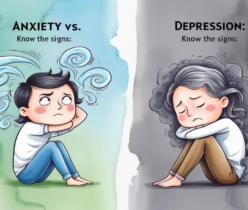
Breaking Free from Anxiety: Science-Backed Strategies to Reclaim Your Peace of Mind
Ananya, a 29-year-old marketing professional, used to wake up every morning with a knot in her stomach. Her thoughts would race, her heart would pound, and the smallest tasks felt like climbing a mountain. “Why do I feel like this?” she often wondered. She wasn’t alone. Anxiety affects millions of people—quietly, invisibly, and often without warning.
But here’s the good news: anxiety is manageable. With the right techniques and support, you can take back control and live with more calm, clarity, and confidence.
In this article, we’ll explore science-backed strategies, natural remedies, and simple lifestyle shifts that can help ease anxiety and strengthen your mental resilience.
Understanding Anxiety: What’s Really Going On?
Anxiety is more than just feeling stressed—it’s a response from your body’s natural “fight or flight” system. When triggered too often, this system goes into overdrive, even in everyday situations.
Common symptoms of anxiety:
- Racing heart or palpitations
- Constant worry or overthinking
- Restlessness or inability to relax
- Difficulty sleeping or concentrating
- Muscle tension and fatigue
If this feels familiar, you’re not broken. Your brain is just stuck in high-alert mode—and it can be gently rewired.
1. Breathe to Reset Your Nervous System
Sounds simple? It is. And it’s powerful.
Studies show that deep breathing (especially box breathing or 4-7-8 breathing) activates the parasympathetic nervous system, helping your body switch from stress to calm.
Try this:
Inhale for 4 seconds → Hold for 7 seconds → Exhale slowly for 8 seconds
Do this for just 2–3 minutes when anxiety strikes.
2. Move Your Body, Change Your Mind
Exercise is nature’s antidepressant.
Regular movement:
- Increases endorphins (your brain’s feel-good chemicals)
- Reduces cortisol (the stress hormone)
- Improves sleep and self-esteem
You don’t have to run a marathon—just a brisk 20-minute walk, yoga flow, or dance session in your living room works wonders.
3. Fuel Your Brain Right

Nutrition plays a huge role in mental health.
Some anxiety-friendly foods:
- Fatty fish (like salmon): rich in omega-3s for brain function
- Leafy greens: loaded with magnesium to calm nerves
- Berries and citrus fruits: antioxidants to fight inflammation
- Nuts and seeds: healthy fats and zinc
Avoid excess caffeine and sugar, as they can spike anxiety levels.
4. Journaling: Untangle Your Thoughts

Writing down your worries can ease mental overload.
Try the “brain dump” method before bed:
Write whatever’s on your mind—no filter. This clears your head and helps you gain clarity.
Also, list 3 things you’re grateful for. Gratitude literally rewires your brain for positivity.
5. Mindfulness and Meditation

Mindfulness is not just a trend—it’s a tool.
Apps like Headspace or Calm offer guided meditations that teach your brain to slow down. Even 5 minutes a day can reduce anxiety symptoms over time.
Pro tip: Practice mindfulness during daily tasks—like brushing your teeth or sipping tea. Be fully present.
6. Talk It Out: Don’t Go It Alone
Sometimes, the best therapy is therapy.
Speaking with a counselor or joining a support group can help you:
- Reframe negative thinking
- Learn healthy coping skills
- Feel seen, heard, and supported
Online therapy has made help more accessible than ever.
Final Thoughts: You Are Not Your Anxiety

Remember Ananya from the beginning? She didn’t magically “cure” her anxiety overnight. But she started small—breathing deeply, journaling each night, walking daily. And slowly, life began to feel lighter.
You can do the same.
Anxiety is not a life sentence. It’s a signal. A call for change, care, and connection.
Take one small step today—your peace of mind is worth it.
✅ Want more tools to support your mental wellness?
Visit Fittrru.com for expert tips, natural remedies, and personalized guides.
📚 Sources:
- Harvard Health Publishing: “Relaxation techniques: Breath control helps quell errant stress response”
- Mayo Clinic: “Anxiety Disorders”
- National Institute of Mental Health (NIMH)
- Journal of Clinical Psychology: “Effectiveness of Mindfulness-Based Stress Reduction”


